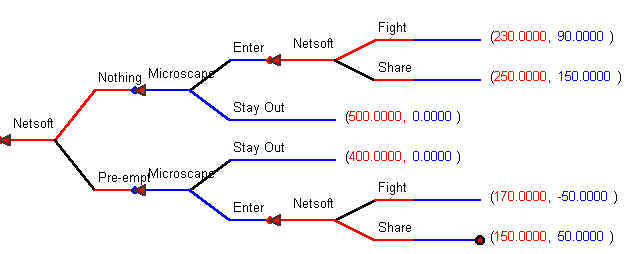Commitment I
In the Coke - Pepsi game commitment to a strategy is a
way to deliberately elicit particular behaviors. The same idea can be used to model
social structures. Consider interpersonal relations.
 Sally has a significant other. His name is Ted. They have been
dating for some months without making any sort of formal commitment. The implication is
that they could date others at their own discretion. Ted wonders "Shall I give my
class ring to Sally and make a commitment". In offering the ring Ted is making
a commitment. Does Sally have a way to enforce it? Is Ted's
commitment to be
'true' credible? As the game unfolds Sally must then decide whether or not she will accept the
ring.
Sally has a significant other. His name is Ted. They have been
dating for some months without making any sort of formal commitment. The implication is
that they could date others at their own discretion. Ted wonders "Shall I give my
class ring to Sally and make a commitment". In offering the ring Ted is making
a commitment. Does Sally have a way to enforce it? Is Ted's
commitment to be
'true' credible? As the game unfolds Sally must then decide whether or not she will accept the
ring.
In offering the ring Ted is making an implicit commitment,
a promise, to not date, and expects a reciprocal commitment from Sally. Should one of them
break the implicit covenant then the ring will not be returned and there will be some
histrionics, embarrassment, and perhaps the opprobrium of friends. Ted is out at least
the cost of the ring if he breaks his commitment. The leverage that Ted has to
enforce Sally's commitment is her 'reputation' in the aftermath of a break-up.
 You could continue the story through two more
stages, an engagement and then marriage. The engagement announces the intention
to continue the monogamous relationship to the alter. The marriage vows articulate
the details of a commitment to a strategic plan.
You could continue the story through two more
stages, an engagement and then marriage. The engagement announces the intention
to continue the monogamous relationship to the alter. The marriage vows articulate
the details of a commitment to a strategic plan.
You should be able to model the relationship
between Ted and Sally as an extensive form game. First think of the names for nodes
that represent the point at which decisions have to be made. Enumerate the branches
coming off each node. Think about the notion of commitment and how each makes it credibly.
Before you label it, the game tree might look something like: 
Now ask yourself whether the 'commitment' discussed in this
dating game is the
same as the usage of commitment in game theory.
For a rather more twisted look at credible
promises, read about the Corleone family in Mario Puzo's The Godfather.
 Sally has a significant other. His name is Ted. They have been
dating for some months without making any sort of formal commitment. The implication is
that they could date others at their own discretion. Ted wonders "Shall I give my
class ring to Sally and make a commitment". In offering the ring Ted is making
a commitment. Does Sally have a way to enforce it? Is Ted's
commitment to be
'true' credible? As the game unfolds Sally must then decide whether or not she will accept the
ring.
Sally has a significant other. His name is Ted. They have been
dating for some months without making any sort of formal commitment. The implication is
that they could date others at their own discretion. Ted wonders "Shall I give my
class ring to Sally and make a commitment". In offering the ring Ted is making
a commitment. Does Sally have a way to enforce it? Is Ted's
commitment to be
'true' credible? As the game unfolds Sally must then decide whether or not she will accept the
ring. You could continue the story through two more
stages, an engagement and then marriage. The engagement announces the intention
to continue the monogamous relationship to the alter. The marriage vows articulate
the details of a commitment to a strategic plan.
You could continue the story through two more
stages, an engagement and then marriage. The engagement announces the intention
to continue the monogamous relationship to the alter. The marriage vows articulate
the details of a commitment to a strategic plan.